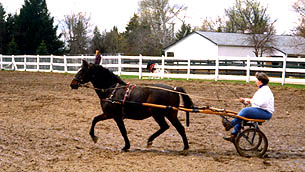
UVEITIS
It's the number one cause of blindness in horses, and there is no cure.
Recommended treatments aren't very effective either.
When your horse has the first episode, and the vet tells you it's uveitis,
you ask, "Will he go blind?"
Usually, the vet says, "Maybe not. It all depends..."
The more accurate answer is, "Almost certainly.
And then he will almost certainly have to be put down."

No one expects to have to put their horse down.
Then they find that the horse is blind, depressed and anxious,
won't move unless someone is holding a lead rope.
That's no life for a big, active animal.
Then the uveitis continues to destroy the eyes.
The horse isn't just blind and depressed.
Now he has ulcers on the eyes and they aren't healing.
The eyes shrink.
Are you going to have his eyes removed?
Have fake eyes inserted so he doesn't look so bad?
You ask the vet, "Is he in pain?"
And the vet answers, "Well, that's why you give him aspirin every day."

You notice that there are a number of problems now which didn't exist before.
Your horse seems to be allergic to more and more things.
With his immune system down, he's a sitting duck for everything going around.
You get him the shots for everything the vet has ever heard of.
You're afraid to worm him because the wormer seems to trigger
extra-bad episodes of eye inflammation.
Then he colics for no apparent reason,
and you wonder if you could have prevented it by worming him.
Finally, one day you look at the sad, miserable thing that was once your happy horse friend,
and you say, "This doesn't have to go on."
You know that you have done everything for him that can possibly be done.
The problem is that with uveitis, that "everything" is nothing.
So one day you take your horse to the state veterinary hospital
and help him out of a miserable life.

That is what happens to most of the horses with uveitis.
What about the rest of them?
Snapper is a blind horse with uveitis.
He has been blind, now, for about a year and a half.
He seems to be making a good adjustment.
He hasn't cantered yet, but that will come.
For a while he was afraid to move. He just stood in his stall.
Outside, he called constantly and stayed where he had been left.
Turned out indoors, he jumped up and down in place, got down and rolled,
and then called for someone to come and get him.
During this time, he was worked every day in harness.
Also, Anita began to teach him word commands for
stepping up and going down and turning left and right.
She put rattly plastic ties around the top bar of his fence
so that if there was any breeze, he could hear the fence.

She stopped trimming his whiskers so he could use them to sense
things before running into them with his nose.
For a long time, being worked meant
just getting him to walk forward.
Eventually, he was willing to trot.
Now he wants to canter, but isn't quite brave enough.
He hasn't had a bad experience yet of being run into a wall or fence.
He trusts everybody because no one has been careless with him.
He trots around in the pasture by himself.
Every single person going into or out of the barn pats him and gives him a treat.
Once in a while he forgets he's blind for a few minutes,
gets his head and knees and tail up and trots the old Snapper trot.

He hasn't gone very far down the road since he went blind, but lately
he made it down the drive way and past two houses.
Usually he does a few laps around the big hay fields in the back.
He's willing to go through water and over rocks, around gates,
past moving machinery and cars, groups of people and other horses.
People say, "Are you sure he's blind? I can't believe it."
He doesn't look the same because he's fat from all the treats.
His eyes are slowly turning white starting in the middle.
He's wormed with the kind you put in the feed every day.
On bright or windy days, he wears a fly mask outside.
Every day he takes aspirin and antihistamine and about six supplements.
In harness if he gets frightened, he stops.
Since he's blind, he isn't afraid to go out at night.
Anita sometimes hitches him up for a spin after dark.
As long as she can see the white fence, they're fine.
If you have a horse that has been diagnosed with uveitis,
and you would like to hear how others have coped,
contact the uveitis network.

This purpose of this page is to show that you don't necessarily
have to put your blind horse down.
It is possible for a horse to make a good adjustment in the right circumstances.
The Website of the Equine Recurrent Uveitis Network